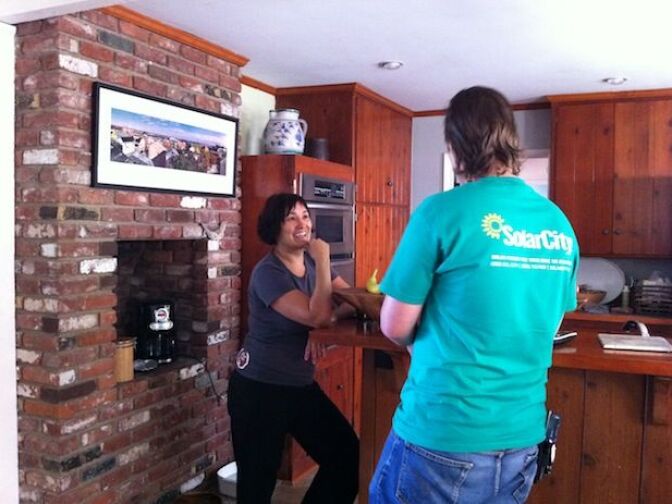This story is free to read because readers choose to support LAist. If you find value in independent local reporting, make a donation to power our newsroom today.
This archival content was originally written for and published on KPCC.org. Keep in mind that links and images may no longer work — and references may be outdated.
Solar panels sell, but energy efficiency saves
Rooftop solar energy thrives in the Southland. But efficiency measures play a large role in satisfying California consumers' demand for power. Using renewable energy better is one way to sell more rooftop panels.
Dogs – and guys in green t-shirts – bang in and out of Lisa Dickerson's house on a bright Palos Verdes hillside. The three mixed-breed mutts – "Squirt, Bailey and Oochiebella" – are always underfoot.
The guys are there to power her property with the sun. "I've always wanted to get solar panels," Lisa Dickerson, a hair stylist who works in Manhattan Beach, says. "I looked into it a couple years ago it was soooo expensive, and I have the sun and a wide open spot, so why not?"
The company she chose, Solar City, lets homeowners lease rooftop systems. For her three-bedroom house, Dickerson would pay around 1$50 a month – less with a down payment. That system could save her the amount of her Southern California Edison bill most months.
Solar City also told Dickerson that they could help her use less energy at home. "They kind of offered that," she says, "when they came to do the audit for the panels up on the roof, and I said sure, why not?"
The company’s Scott Lowery notes her home's orientation to the sun, Craftsman construction, climate zone. He also asks Dickerson about her home energy habits.
"What temperature do you keep the house at?" Dickerson wrinkles her nose. "68 I think?" Lowery nods, and notes. "That sounds right."
Energy efficiency audits cost homeowners who lease Solar City panels another $1,750 up front. (Dickerson took advantage of an initial promotion.) Scott Lowery says that like solar, energy-efficient homes prove their value over time. "What we’ve found is that homes are two to three times as leaky as they need to be, and if you’ve paid to heat or cool that air, that translates to a lot of energy savings if you save that," says Lowery.
You hear three words a lot during an energy audit: "low-hanging fruit." Lowery says efficiency is all about finding the fastest ways to reduce spending on energy.
Those aren’t as obvious as you’d think. "The window industry has done a really good job of marketing," he points out. "When that's definitely nowhere near the most cost effective step because windows are expensive. You can do a lot of stuff for a lot less."
In a doorframe, Lowery sets a cover with a powerful fan. That fan will suck air out of Dickerson's house in a blower door test. Higher-pressure air from outside will force its way in. "As we get this fan rolling, you'll be able to feel light switches, under sinks, can lights, all kind of things that leak that you weren't aware of."
Plumbing and electric penetrations – where the service guy cuts out insulation for a pipe or a line – are where the money goes, Lowery says. His team plugs small holes with spray foam, then recommends and ranks more complicated fixes. "In terms of importance, it goes attic, walls, crawlspace," Lowery says.
Helping people use less energy is good for business, says Jim Cahill, Solar City's regional director. Investment banks help finance Solar City leases for home panel installations. Banks and consumers find that energy-efficient homes are better investments than leaky ones.
"If you want to sell someone a large system, you can do that," Cahill says. "But you may be paying them for a system that’s actually paying for inefficient use of power."
In this state, an energy code known as Title 24 tries to prevent that from happening. Karen Douglas, chair of the California Energy Commission, says people in this state have collectively saved $56 billion in electricity and gas costs since those rules began three decades ago.
"Energy efficiency is a large shadowy part of our portfolio – it's hard to see the energy you don't use," Douglas says. "But it's helped us immensely."
Douglas, and Solar City’s Scott Lowery, also concede that there’s a lot of variety in the way homes meet those standards – and that California's system depends on aggressive, thorough inspections by well-trained people. "The funny thing is, the way that folks have built homes hasn’t changed that much throughout the years, so I can test a house that’s 50 years old or a house that’s 10 years old and I can pretty much count on the same poor quality of construction. I hope there’s no general contractors listening!" Lowery laughs.
Lisa Dickerson finds it sort of funny that the house she's owned for six years leaks so much energy. She jokes that at least the birds that hang out in the eaves and on the rooftop have found a warm haven.
"If I'm paying a bill, heating the birds, wasting my money, what's the point of it all?" Dickerson throws up her hands. "So if we lock up this house up tight as a drum, make it energy efficient, cheaper, better: win-win."
The allure of solar energy attracted Dickerson into this project. But the longer-term value of energy efficiency looks likely to seal the deal.










